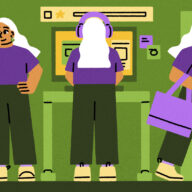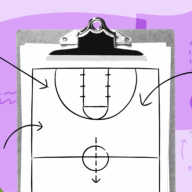Work addiction is real – here’s how to kick the habit
Not all work addicts are created equal. Take our quiz to find out if and how this affliction manifests for you.
5-second summary
I’m not sure exactly how high my fever is but it has definitely hit the delirious cold-sweat range.
It’s just a bout of flu. It will pass. But in the moment, it feels debilitating. My most pressing concern is my phone and the fact that it’s out of reach. It is not, however, because I want to text my partner for ibuprofen, soup, or another blanket (all of which I do very much want).
No. I have Slack on my phone. I can check in with the rest of my team. I have things to do. I have emails to answer, notifications to respond to, checklists to finish. I have to work.
Sure, I gave my editor the heads up I wouldn’t be in. Sure, he’d told me in no uncertain terms that I was to rest up and not worry; everything would be handled.
But what if…?
This wasn’t the first time I’d tortured myself for not being at work. I’d had a crisis of conscience for taking two days off at Thanksgiving. Over winter break, I’d completed work tasks in secret because I knew my editor would tell me – as he’d already told others – to stop. He’d make me go bond with my family, or gorge myself on pastries, or do literally anything but work.
So why can’t I disconnect, even when I have a good reason?
It’s not, as it turns out, due to a hyper-refined work ethic. Rather, I’m an addict, and my job is my drug of choice.
Is it possible to be addicted to work?
Yes, work addiction is a real condition. Psychologist Wayne E. Oates coined the term “workaholic” in his 1971 book, Confessions Of A Workaholic: The Facts About Work Addiction. According to Oates, workaholics felt the “compulsion or the uncontrollable need to work incessantly.” And, much like alcoholism (and other addictions), work addiction has been known to damage an individual’s health, happiness, interpersonal relationships, and ability to function socially.
Despite that, 48% of Americans self-identify as workaholics – and for many, this a proud identification. Being a “workaholic” is often synonymous with dedication, ambition, and initiative. Employees are exhorted by managers to consistently go “above and beyond.” Raises, promotions, and other perks are handed out to those who take on “extra responsibilities.” If an employee refuses a task because it’s not part of their job, they’re at risk of being viewed as difficult and “not a team player.”
Contemporary researchers, however, such as Malissa A. Clark, Ph.D., make an important distinction between “work addiction” and “work engagement.” According to Clark, the difference comes down to motivation. “Engaged workers are driven to work because they find it intrinsically pleasurable – they truly enjoy it – while workaholics are driven to work because they feel an inner compulsion to do so,” she wrote in an article for FastCompany.
So how do you tell the difference between a compulsive employee and an enthusiastic one? The key is to determine what’s driving their behavior.
What causes workaholism?
Much like substance addiction, there are myriad reasons why someone becomes addicted to work.
The first and most basic is that work addiction fulfills an underlying psychological need. Similar to alcohol or other substances, work can become an escape. Rather than facing and dealing with uncomfortable or unpleasant feelings and situations, the individual immerses themselves in work tasks. The worker may literally escape a situation by going to work outside regular hours, or this escape can be more figurative – perhaps instead of paying attention to family or personal dynamics, they think about work-related topics.
Work addiction may also stem from overcompensation. If someone feels less competent in another area of their life – family, social life, hobbies, etc. – they may devote excessive time and energy to work-related tasks in order to achieve that feeling of competency and validation.
The worker may also be reliving old patterns. It could be related to an inability to establish boundaries, attempts to gain approval, or a trauma-related coping mechanism.
That said, work addiction may also be the result of underlying or coexisting mental health conditions, particularly ones such as obsessive-compulsive disorder or bipolar disorder. In addition, work addiction can also cause conditions like depression if not treated.
What are the symptoms of a workaholic?
Someone with a work addiction may show classic signs like working long hours, prioritizing work over other responsibilities and obligations, or being obsessed with work-related success. However, these symptoms may manifest differently in different people.
Psychotherapist Bryan Robinson identified four types of workaholics:
- Procrastinating workaholics, who put off work until the last minute and then rush to finish.
- Bulimic workaholics, who either perform perfectly or not at all.
- Attention-deficit workaholics, who begin multiple projects, but get bored and move on to other challenges.
- Bureaupathic workaholics, who prolong tasks and create additional work.
It’s important to keep in mind that there are no clear-cut parameters when it comes to identifying work addiction. It’s natural to want a list of boxes to check off that will provide a definite yes or no answer, because conditions like addiction are rarely ever so simple. With that in mind, there are a few things you can look out for as potential indicators of work addiction:
- Working long hours when not necessary
- Losing sleep in order to work
- Work-related obsessions
- Paranoia and intense fear over work performance
- Deteriorating relationships with others as a result of work
- Neglecting personal health and well-being due to work
- Missing significant events or milestones due to work
Any of these traits on their own, or that occur infrequently, are not necessarily definitive proof someone is addicted to their work. But multiple statements that apply to someone over a period of time may indicate a more serious problem.
How do I break my work addiction?
I’ll be honest with you: There is no simple fix for work addiction. I know that’s not the cheeriest conclusion to come to, but it’s best to rip the Band-Aid off fast.
The fact is, work addiction is an addiction. That doesn’t mean it’s hopeless; it’s just important to be realistic. The first step – as cliché as it sounds – is to recognize that there is a problem. If you’re unable to break your addiction on your own, it’s a good idea to consult with your doctor about the best way to move forward. There are both inpatient and outpatient rehabilitation programs that can help manage your compulsive behaviors, though not everyone will need to go that route.
That said, a mental health assessment can be beneficial, especially if you haven’t checked up on your mental health in a while. As I said earlier, some mental health conditions can cause or exacerbate work addiction, and vice versa.
An alternative to formal, one-on-one therapy is attending group therapy, such as a 12-step group like Workaholics Anonymous, which has a self-assessment questionnaire on their site, as well as an assortment of resources.
If you have a good relationship with your manager or a member of human resources, they may be able to help you access resources or assist in other ways.
In addition to therapy, lifestyle changes can also improve your ability to handle your work addiction. These can be very simple changes, like taking up a new hobby, or as substantial as changing career.
And while a listicle won’t cure a work addiction, there are some very quick, simple things you can try, including:
- A digital detox. Section out time in your day to be device-free. Read a book, go for a walk, listen to a (not work-related) podcast, bake cookies – whatever works for you. Grab some time and switch everything off.
- Mindfulness. It’s not for everyone, but it can be helpful. Meditation or mindfulness can provide emotional insight, improve concentration, and enhances awareness of your thoughts, feelings, and body.
- Sleep properly. Stress is exhausting, and if you have a work addiction, you are definitely stressed. More to the point, everyone needs a good night’s sleep, and very few of us actually get enough healthy rest. If you’re lying awake thinking work thoughts, get up and do something. Change the channel your brain is on. Distract yourself, in other words. I like audio books (actor Adjoa Andoh‘s voice is so soothing), or a podcast like Lore by Aaron Mahnke. (I’m a nerd, okay?) YouTube also has loads of “sleep music” playlists which will do in a pinch.
- Don’t say “yes.” I’m a “yes” person. You ask for something? OK, I’ll do it. I may be stretched way beyond capacity, but I’ll take on one more thing anyway. Don’t do that. You don’t have to say no; just say, “Let me get back to you.” Take some time to evaluate your resources. This goes for volunteering, too. Ask yourself: Do you have time for the task? Do you have the mental and physical space to take it on? Are you already over-extended? What happens if you decline? (It’s shocking how often the answer to that is the thing gets done anyway.)
- Simplify. Choose one priority task per day. One. Focusing on just the one task in front of you means that you’re less likely to get distracted or overwhelmed by an endless list of things to do. One of the key things to remember is: work smarter, not harder.
- Nominate a buddy. Whether it’s a colleague, friend, or family member, find someone who will hold you accountable and clue them in. Make sure it’s someone who will be supportive and able to call you out when necessary. It’s hard to break a habit if you don’t realize you’re doing it, and those around us are often more aware of our behaviors than we are.
- Find your work/life balance. I know it sounds generic. I know it’s not simple. But work/life balance is important, and attainable. When I was working on my thesis, my coach made me schedule a day off every week. There were two rules: I had to take it no matter what and I couldn’t do anything related to my thesis. The first month or so was difficult. I felt guilty, lazy, and like I wasn’t trying hard enough. Eventually, though, I began to relax into it. Taking a day off actually made the rest of the week feel less stressful.
- Track your hours. I use Hubstaff, but anything will do. Not only do I track how many hours I work a day, I also track how much time I spend doing individual tasks. At the end of the week, I can see how much time I’ve spent writing blog posts, editing for my colleagues, or even attending meetings. Then hold yourself accountable. If you spent longer on a task than it should’ve taken, ask yourself why. How often are you working long hours? Is there a way you can arrange your tasks and responsibilities to change that?
How team leads can help prevent work addiction
If you’re a supervisor, you can play a key role in helping your team avoid work addiction. Here’s how:
- Encourage people to take some time off. Assure them (like my supervisor did), that they can truly unplug from work while they’re away. If you sense that a team member has anxiety about this, talk to them about their particular concerns and help them identify where and how their work can be routed during their absence.
- Create a culture that respects people’s work-life balance. Avoid sending emails or messages late at night or on the weekends so people don’t feel that they have to respond. If you’re generally a night owl or early bird, be sure that everyone knows you don’t expect responses when they’re offline. (And be really sure. Remind people often. Saying it once might not be enough.)
- Lead by example. Take time off yourself. Let your staff know that you won’t be checking email, Slack, or other messages during that time. Make sure people have your cell number in case of emergency, but be sure to define “emergency” as a truly catastrophic event.
- Empower people to say “no.” Give team members a framework for learning how to field requests that might interfere with their other work.
- Protect your team members’ time and focus. When other teams request resources from your people, make sure your folks truly have the time and bandwidth to assist. If they don’t, take it upon yourself to shift their assignments or find a way to divert the request elsewhere.
Take some time off, really
Fortunately, when I had my overworking epiphany, I was in a position where I could take time off. As soon as I was able to crawl out from under the duvet, I marked out a vacation the earliest possible. I’m not going anywhere; I’m just… not working.
Taking time away will give you an opportunity to gain some perspective and decide what you want – both personally and professionally. How do you feel about your work? What are the fears and anxieties you have when you’re not working, and where do they come from?
These can be big questions with complex answers, but it is important to understand why you overwork. Once you understand the causes, you can develop a way forward. Create new habits and routines, identify the stressors that trigger your compulsions, and re-evaluate your expectations of success.
Leks Drakos is a rogue academic specializing in monstrosity, post-apocalyptic narratives, and the contemporary novel. He’s also a content writer for Process Street. Follow him on Twitter.













































